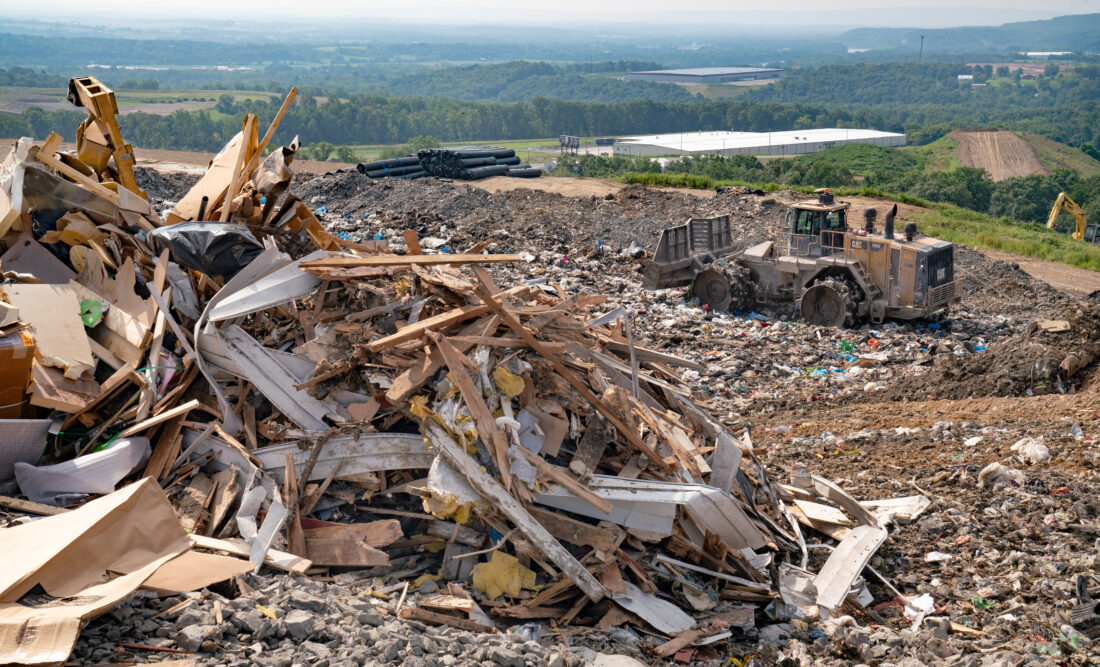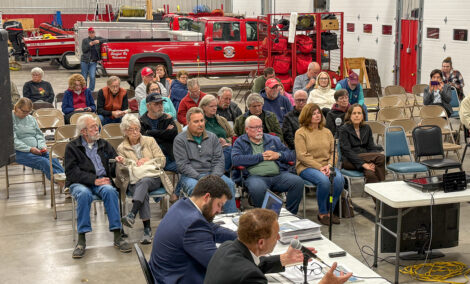Commissioners: Review of landfill’s finances to be complex, thorough — and will take time

Trash is pushed across the working face of the dump at the Lycoming County Landfill in Montgomery Wednesday Aug. 9, 2023. The landfill’s management wants the public to be aware that they need to properly dispose of batteries in products and not leave them in trash that’s sent to the landfill because it can start fires at the dump. DAVE KENNEDY/Sun-Gazette
Despite a churning rumor mill, the Lycoming County Commissioners say they have no immediate plans to sell or close down the Lycoming County Resource Management Services, commonly referred to as the landfill.
“The rumor that it’s sold is far from the truth at this point,” Vice Chairman Marc Sortman stressed.
“We’re not even close to a final decision on anything,” he said.
“We’re probably a year away at the earliest until anything would happen,” the commissioner said.
The rumblings began when, as the financial department was compiling the 2025 budget, it discovered that the landfill was not operating as efficiently as it had previously been presented.
“We were told that recycling is something that gets operated on as a loss. It’s a benefit to the taxpayers. It helps in the sense that you don’t put as much in the landfill, so it helps the longevity of the landfill,” County Commissioner Chairman Scott Metzger said.
“We were told that the transfer station basically breaks even, and that the landfill was making money. And in reality, those things weren’t going on,” he explained.
Commissioners say they were told that rate increases were not necessary. The last increase occurred in 2009, therefore they were not rising in tandem with inflation and other general cost increases.
Muddying the finances even more is the fact that for decades, money made from the landfill was put into the general fund, and not separated,” Metzger explained.
“So as expenses were being paid out of the general fund, the income obviously wasn’t the same coming in,” he explained, an oversight that has now been corrected.
“A lot of the fees that they do accumulate, they have to put back for closure funds, according to the Department of Environmental Protection, Metzger explained.
A lawsuit with former controller Krista Rogers put additional roadblocks in getting the finances sorted out.
“That stopped basic accounting from being done within our departments,” Sortman explained.
“We also didn’t have enough employees in these departments,” Metzger said.
“At one time, the fiscal department had nine accountants. When I came in, they were down to three, and then down to two after COVID,” he explained.
“So it’s a combination of factors that put us in the financial situation where we don’t have accurate numbers,” the commissioner said.
Due to costs and regulations, government entities have moved away from owning their own landfills.
“Back in the late 70s, early 80s, there were 5,000 landfills operated by municipalities and townships throughout the state,” Commission Mark Mussina said.
“Now they’re down to 50 that are government run and Lycoming County is the only county that operates the landfill. Everything else is privately owned, aside from some authorities,” he explained.
“What is being evaluated is what direction do we go? Do we go through an authority? Do we do status quo and try to get it changed around by cuts? Do we sell it and or do we get a management team,” said Sortman, who is overseeing the landfill for the commission.
He said he has reached out to landfills in Lackawanna and Clinton counties to gather more information about their operations versus those in the county.
One possible avenue of cost savings is staffing cuts.
“We have the same amount of employees as a landfill that generates seven times the trash that we generate. We have more equipment than any that generates the small amount of trash we generate, and we have more equipment than ones that generate five to seven times what we generate. So we have a lot of things we have to look at,” Sortman said.
“Right now, we are working directly with the management of the landfill, which is Jason Yorks, to change the way we operate,” he said.
Much of that operational model has been in place since the landfill opened in the 1980’s, Sortman said.
At the Thursday commissioners meeting, they opened bids for leachate force main, which would save transportation costs.
“We are desperately just looking at costs and saying, ‘what can we reduce? What can we do differently to make us more efficient,’ ” Sortman explained.
“Obviously trucking stuff costs more. We’re trucking all the stuff from the transfer station down, so maybe we eliminate some hours at the transfer station to reduce those costs. We’ve put a mandate on overtime to help eliminate some costs of overtime,” Sortman said.
“Now we have teams in place that are diving in this daily and getting on both ends of the landfill, with their business office and with the county, through fiscal and through the controller,” he said.
“We’re looking at all options, and at the end of the day, it’s just what makes the most financial sense,” Sortman said.
And, though staffing cuts are one option being looked at, the commissioners are quick to point out that this is not a reflection on those working at the facility.
“The employees over there are top notch. They do an excellent job. This is not a reflection on them. This is a reflection on the everyday operations, on what’s being done on the management end,” Metzger said.
“They have some big contracts. This services a lot of counties. We take out-of-state garbage, so all kinds of things that have to be looked at in order to make this more efficient because if this was a business at this point, a business owner, one would say, ‘we would have to sell it or be bankrupt,'” the commission said.
“So we had to look at it and ask, ‘is it a burden on our taxpayers, or is it an asset to our taxpayers? We’re certainly not going to hang on to something that’s going to be a burden,” Metzer stressed.
Usually a down month for the site due to the weather and construction being light, January was a profitable month for the landfill, Metzger said.
And, while big decisions lie ahead for the commissioners, they are always mindful of the impact to all involved.
“This comes down to a business decision on whether this is something that’s an asset for the taxpayers or liability going over the long run, but at the same time, we know that there are employees that are involved in this,” Metzger said.
“We’re concerned about them. We’re also concerned about our small haulers in the area, making sure they’re not affected, because they’re small businesses,” he said.
“So whatever decision we make, we want to make sure that our employees are protected, the small businesses are protected, the small haulers and the residents are taken care of,” he said.





